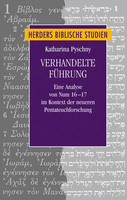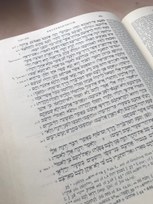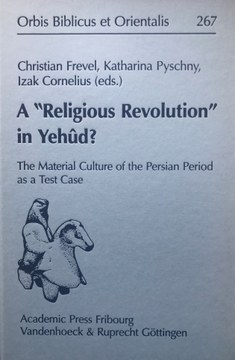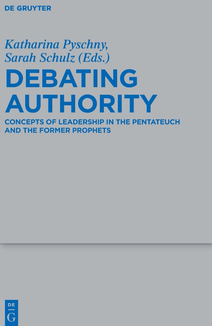Research
Katharina Pyschny's research draws transversal lines between exegesis, sociology and archaeology or iconography in a unique way and thus holds enormous interdisciplinary potential.
 Exegesis of the Book of Numbers
Exegesis of the Book of Numbers
Since her dissertation, a historical-critical analysis of Num 16-17 against the backdrop of the current Pentateuch debate, research into the literary history and theology of the Book of Numbers has been an important field of research for Katharina Pyschny. In the context of international conferences and publications, she has presented exegeses of Num 1-4; 11; 12; 18; 32, among others, and is working in a longer-term perspective on writing a German- and English-language commentary on the Book of Numbers.
 Centralisation and Deuteronomy
Centralisation and Deuteronomy
In the context of an almost three-year research stay at the University of Lausanne (Switzerland), Katharina Pyschny has researched the processes of centralisation reflected in Deuteronomy from a sociological, exegetical, theological and historical perspective. The project aims to understand centralisation in Deuteronomy as a complex process that encompasses not only cultic but also religious, social, economic, administrative, etc. aspects, and to situate it in the context of the religious diversity of the Persian period in ancient Israel. The publication of these research results, which take a comparative look at the conception(s) of centralisation in Zion theology, is in preparation.
 Material Culture of Ancient Israel/Palestine in the Context of the Southern Levant
Material Culture of Ancient Israel/Palestine in the Context of the Southern Levant
Since co-editing one of the most important publications on material culture in Persian Israel, which brought to light significant insights into the religious history of ancient Israel - especially the interferential formation of Judaism in the post-exilic period - the study of the material culture of ancient Israel/Palestine in the context of the Southern Levant has been one of Katharina Pyschny's important fields of research. With a focus on the Iron Age and especially the Persian and early Hellenistic period, she has presented important studies not only on individual find categories, but has also dealt with broader questions on the religious symbol system of ancient Israel and the Ancient Near East. Her research is characterised by a special methodological reflexivity that seeks to make iconographic material fruitful as an independent source for the reconstruction of the (religious) history of ancient Israel/Palestine. She is currently editing a volume on incense practices in the Southern Levant, which stands out for its interdisciplinary and comparative perspectives and will be published at the end of 2021.
 Concepts of Leadership in the Old Testament
Concepts of Leadership in the Old Testament
Katharina Pyschny has been working on leadership concepts in the Old Testament since 2016 (in cooperation with the Protestant Old Testament scholar Sarah Schulz from the University of Erlangen). In the context of a research group of the European Association of Biblical Studies entitled "Concepts of Leadership in the Hebrew Bible", the two researchers have held three successful international conferences on the topic, the first of which has already been published in a BZAW volume. The other two conferences will be published together in a second BZAW volume, which will be released in summer 2021. Furthermore, a joint editorship on the office of the high priest in the Persian period is planned.
In addition, Katharina Pyschny is working on the analysis of Old Testament leadership concepts in the context of current leadership discourses within the Catholic Church and, against this background, has presented articles on phenomena such as mentoring, delegation and participation as well as an Old Testament perspective on synodality.
 Biblical Anthropology
Biblical Anthropology
In Berlin, Katharina Pyschny will strengthen the anthropological focus of the Institute through an overall biblical perspective. In her discussion of recent discourses on the perfection of the human being, she will focus in particular on the issues of the perfection and perfectibility of the human being and work on the biblical concept of "new creation".
